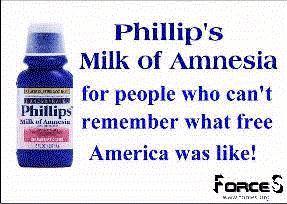Non Scents in Nova Scotia |
|
The United Pro Choice Smokers Rights Newsletter
Voters for Fairness and Freedom
Smokers Welcome Chat Rooms Schedule
|
The Globe and Mail, Saturday, April 29, 2000 Non-scents in Nova Scotia
HALIFAX HYSTERIA
Claiming to be canaries in a coal mine, an outspoken
'chemical-sensitive' minority has got perfumes and hair
products banned in the maritime capital. The epidemic is
probably all in their heads, but their fellow citizens
are going along politely, like the good Canucks they are. Halifax -- I am sitting in a Halifax hospital waiting room, reading a magazine. I am also committing a public offence. This morning before I left my hotel room, I showered with aloe-scented soap, applied honeysuckle deodorant, combed a glob of fruity-smelling gel through my hair and, before dressing, liberally spritzed my neck with Dior's J'adore eau de toilette (white-hot-rose notes), my wrists with Noa (an ethereal musk), and the backs of my knees with Chanel No. 5 (a classic). Slipping into a trench coat marinated in that drugstore favourite, Charlie, I hopped in a cab and came straight here to the Grace Health Centre in Halifax. The place is humming with activity as I sit leafing through an outdated copy of Canadian Living. A swirl of nurses, doctors, patients and visitors hurry by my chair, and a number of them make audible gagging noises as they pass. "Some people sure do wear perfume!" a passing pregnant woman exclaims irritably. A nurse turns, coughing, to an elderly receptionist, "Have you died of that smell yet?" The receptionist shushes her companion and nods her head in my direction. I turn my eyes to the spinach-quiche recipe on my lap. Soon a small group of nurses has congregated at the reception desk. After a brief whisper conference, a middle-aged woman in pink scrubs approaches. I look up and read her name tag. Nurse Gillian McKinnon. "Excuse me, dear," she says. "Are you aware that this hospital is a fragrance-free environment?" "Pardon?" I say. "We ask that you respect our scent-free policy, since many people here are highly sensitive to perfumes and such." As I gather my bag to leave, Nurse Gillian McKinnon offers me a look of bureaucratic apology. "But you do smell very pretty, dear," she adds. They are calling it Halifax Hysteria. Three months ago this weekend, a perfume ban became official public policy in this mid-size maritime capital. Since then, all municipal buildings here, including schools, libraries, courts, even City Hall, as well as many workplaces, theatres and shops, have become officially "scent-free." Last month, a teacher in the Halifax-area community of Sheet Harbour complained to the RCMP that Gary Falkenham, a 17-year-old student, had repeatedly violated the school's anti-scent policy by wearing Dippity Doo hair gel and Aqua Velva deodorant to class. The teacher, who claimed Falkenham's deodorant made her vomit, requested that the youth be charged with assault. The RCMP are still deciding whether to lay charges. Last month, an 84-year-old woman was kicked out of City Hall for wearing a dab of scent behind each ear. Another elderly woman was forced to get off a Halifax bus for her offending fragrance. The anti-chemical movement takes a new turn this week: in Halifax a bylaw that would have outlawed all garden pesticides, from slug bait to weed sprays, was narrowly defeated. Another bylaw, intended to phase out such poisons over the next four years, will be debated in hearings starting next week. The Halifax scent crackdown has drawn notice not only in the Canadian press but in The New York Times ("Canada Sniffs and Dislikes the Smell"), The Wall Street Journal ("A City Smells Perfume and Holds Its Nose") and Glamour magazine. The right-wing American Spectator has just run a piece by professional skunk-science debunker Michael Fumento. Dubbing the scent ban the "Halifax holy war," Fumento dismissed the entire North American anti-scent lobby, declaring that "nowhere is it worse than in ocean-fresh Halifax." While the policy has sparked bitter debate among a handful of Halifax city officials and journalists, what's surprising is the relative lack of controversy among Halifax citizens. Most people I spoke to during my visit were more than happy to forgo their carpet deodorizers and hairspray for the sake of a nose-pinching minority. One lady even interrupted her cruller at the "scent-free" Tim Hortons at the West End Mall in order to warn me about my wafting fragrance. "It doesn't bother me," she said. "But you shouldn't wear it other places. A lot of people around here are very sensitive." Stephanie Domet, an editor at The Coast, a Halifax weekly, put it this way during an interview at her downtown office: "The rest of the country may think we're a bunch of crackpots, but I believe some people are canaries in a coal mine. We've created a world where some people are overly sensitive to chemicals. So is it really that much of a hardship for you to not be able to pour on the Charlie?" In this way, the Halifax scent ban is a quintessentially Canadian curiosity. Indeed, this is not the only far-out bylaw in this country, where various towns ban bongo drums, dogs' barks or the bells of ice-cream trucks. (See sidebar.) While anti-scent activists exist across the continent, especially in environment-sensitive locales like California, only in Canada -- particularly in the cordial and conservative Maritimes -- would such a motion be so easily accepted. "Our problem is, we're too darn polite," said Nancy Radcliffe, a columnist for The Halifax Daily News and a rare outspoken critic of the policy. "We don't want to inconvenience anybody, so we're constantly giving up our rights because somebody claims it's offending them." But where did this vociferous anti-fragrance movement come from? And how did this little port capital become a hotbed for a raging international medical debate? The kernel of the conundrum is Multiple Chemical Sensitivity, also known as environmental illness. MCS sufferers claim that chemical fumes caused by everything from cleaning products to mouthwash and chewing gum can trigger debilitating symptoms that include headaches, vomiting, seizures, shock and even death. In the past two years, almost 800 Haligonians have been treated for environment illness-related symptoms, making the condition a veritable epidemic. Groups of MCS sufferers -- who tend to be middle-aged, middle-class white women -- lobbied for the scent ban, some attending meetings at City Hall wearing gas masks. It would be a grassroots political triumph, if not for one small problem: MCS has been widely rejected as a legitimate organic disease by most doctors and researchers across Canada and the United States. In other words, the illness that's shaken Halifax may well have been a figment of the city's collective imagination, a psychosomatic epidemic. Dr. Ronald House, an epidemiologist at the Occupational Health Centre at St. Michael's Hospital in Toronto, researches such epidemics, what he calls "mass psychogenic illnesses." He also regularly treats people with MCS. "From a medical standpoint there is no disease process in [MCS sufferers], and yet they are adamant something is wrong with them," he said. "They are not faking. They really do believe they have a problem." The scare began in 1991 when several hundred employees at the newly built Camp Hill Medical Centre began complaining of illness from contaminated indoor air, also known as "sick building syndrome." Apparently, the cafeteria dishwasher had been leaking fumes, and it was soon fixed. However, many current and former Camp Hill employees maintain that they are sick to this day. Around the same time, the Nova Scotia provincial government sponsored an Environmental Health Centre specializing in MCS and sick-building syndrome. In Dr. House's view, the clinic itself caused the epidemic. "In essence, the clinic acted as a justification for an illness that did not exist." According to Dr. House, psychosocial illnesses have been known to spread like wildfire through workplaces and communities. Outbreaks tend to model themselves on a template of existent illnesses. During the polio epidemic, there were mass outbreaks of "hysterical paralysis." When tuberculosis thrived, so did neurasthenia, a psychosomatic illness that imitated the wasting effects of TB. Dr. House speculated that environmental illness may be a psychosomatic form of contemporary society's real immune-deficiency condition, AIDS. And while Dr. House did not condemn the patients for being caught up in the hysteria, he called the policies that pander to it "a complete march of folly." Charles Moore, who lives outside Halifax in Sherbrooke, says that he has had MCS for the past 40 years. He wears a gas mask whenever he comes into contact with most other human beings, and blames airborne chemicals from perfume and cleaning products for a litany of painful symptoms, including headaches, muscular-skeletal reactions, sores, rashes, hives, chronic yeast infections, red-blood-cell damage and inflamed bowels. "I know [MCS] is real because it has, in a sense, wrecked my life," he said in a telephone interview. He attributes Haligonians' higher acceptance of the illness to their good conscience and level of education about the condition. Dr. Roy Fox of Halifax's Environmental Health Centre, agreed. "Most people are kindhearted in Nova Scotia," he said. "Most people don't want to make other people ill by wearing fragrances." Likewise, most Haligonians do not question why there are signs in their schools, restaurants, hotels and theatres bearing slogans like, "Good Sense is No Scents." They just go along. Kate Dodge, an employee at Nutrition Place health-food store in the Scotia Place Mall and a student at the Nova Scotia School of Art and Design, said pretty much everyone at her school adheres to the ban. When I asked her how the essential oils were selling, she shook her head of red curls. "No one buys the scented products here," she said. "Once in a while someone comes to school wearing a bit of patchouli, and we just look at them like this" -- she wrinkled her nose in a sneer. She went on to say that her mother suffers from MCS. "If she even smells perfume, her skin goes red and her throat closes right up." There are a few vocal opponents. Their unofficial leader is a pink-faced, cordial gentleman by the name of Steve Streatch. Streatch is the city councillor for Halifax's District 1, which includes Sheet Harbour, where Falkenham was barred from school. He is also the only councillor who voiced a serious objection to the anti-scent policy when it was passed on Feb. 1, with a vote of 8 to 15. When I met Streatch at City Hall, I quickly apologized for my flowery violation of the building's anti-perfume policy. He responded by apologizing that I should feel the need to apologize. It was a very Canadian moment. "You smell lovely," he said, offering me a seat in the councillors' lounge. "I feel stupid even talking about this." Streatch said he was most appalled by the rude treatment of elderly citizens under the ban. "These sweet old ladies who've been wearing a little touch behind their ears every day for 40 years come up to me now and say, 'Well I guess I won't be able to come watch you in the council meetings any more.' It's just ludicrous," he said. Streatch, who still wears aftershave, is adamant that the policy is useless. "We're not curing anyone, we're just banning everything in sight." The anti-scent movement has even had an economic impact on the city. Charles Low, the president of the Canadian Cosmetic Toiletry and Fragrance Association, said that, according to his membership, recent sales of "fine fragrances and scented products showed a decided downward slump in the Halifax area." Cynthia Dimmer, a drugstore perfume-counter employee here, backed up this assessment. "You couldn't sell a bottle of fragrance if your life depended on it." Low pointed out that all perfumed products manufactured in Canada are regulated federally through the Canada Food and Drug Act, and therefore don't need to be re-regulated by individual municipal governments. "We get very angry when people put up signs banning scents for 'health and safety' reasons, or when the criminal-justice system is brought in to regulate," he said. "This is like a religious fever." Yet to The Coast's Domet, as for many Haligonians, it's simply a matter of good manners and good taste. "I'm all for perfume freedom," she said, plugging her nose against the cloy of my Charlie. "But sometimes too much freedom can be a stinky thing."

Halifax moves to ban lawn and garden chemicals
Landscape companies vow to fight move to curb pesticides, herbicides |


